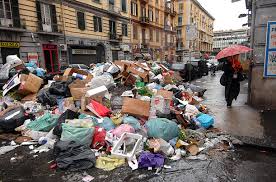记忆方法
将“garbage”分解为两部分:“garb”部分联想到“garage”(车库),想象一个杂乱无章的车库充满了“垃圾”,这样可以帮助记忆“garbage”的意思是垃圾、废物。
以上内容由AI生成, 仅供参考和借鉴
中文词源
garbage 垃圾
原义为禽类内脏。词源不详,可能来自PIE*sker, 切,撕,词源同shear, carve.
英语词源
- garbage (n.)
- "refuse, filth," 1580s; earlier "giblets, refuse of a fowl, waste parts of an animal (head, feet, etc.) used for human food" (early 15c., in early use also gabage, garbish, garbidge ), of unknown origin; OED says probably from Anglo-French "like many other words found in early cookery books." In its sense of "waste material, refuse" it has been influenced by and partly confused with garble (q.v.) in its older sense of "remove refuse material from spices;" Middle English had the derived noun garbelage but it is attested only as the action of removing the refuse, not the material itself.
Perhaps the English word originally is from a derivative of Old French garbe/jarbe "sheaf of wheat, bundle of sheaves," though the sense connection is difficult. This word is from Proto-Germanic *garba- (cognates: Dutch garf, German garbe "sheaf"), from PIE *ghrebh- (1) "to seize, reach" (see grab (v.)).
"In modern American usage garbage is generally restricted to mean kitchen and vegetable wastes" [Craigie]. Used figuratively for "worthless, offensive stuff" from 1590s. Garbage can is from 1901. Garbage collector "trash man" is from 1872; Australian shortening garbo attested from 1953. Garbology "study of waste as a social science" is by 1976; garbologist is from 1965.
权威例句
- 1. A bomb planted in a garbage can exploded early today.
- 今天早些时候,安放在垃圾箱里的一枚炸弹爆炸了。
- 2. Jeez, what garbage!
- 天哪,这是什么破烂儿!
- 3. Furious government officials branded her story "garbage".
- 大发雷霆的政府官员称她的报道为“胡说八道”。
- 4. Personally, I think that's a load of garbage!
- 我个人认为这纯粹是一堆垃圾!
- 5. Children scavenge through garbage.
- 孩子们翻捡垃圾。
